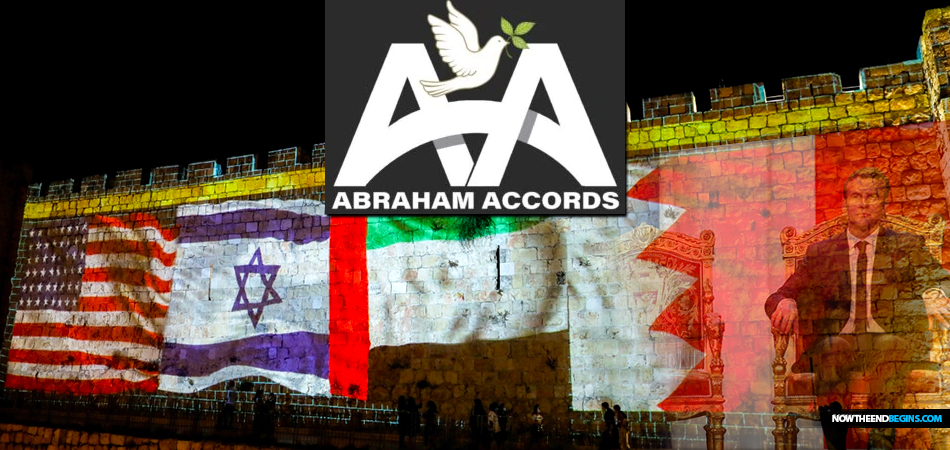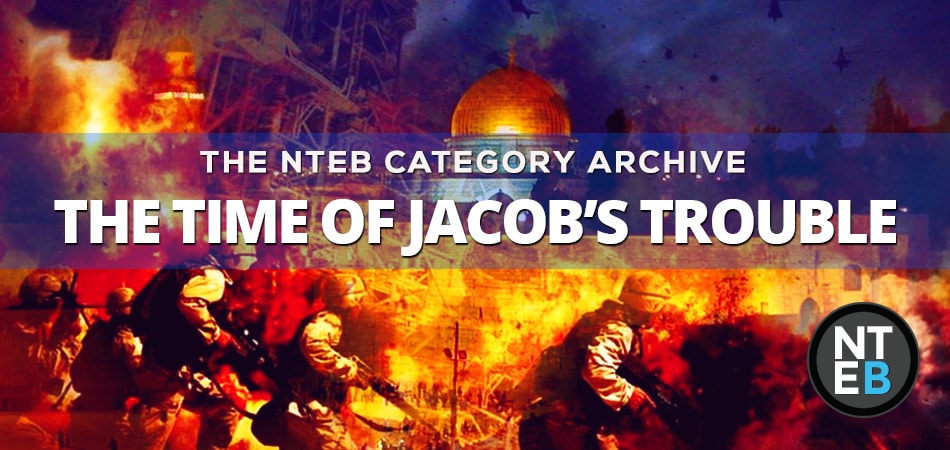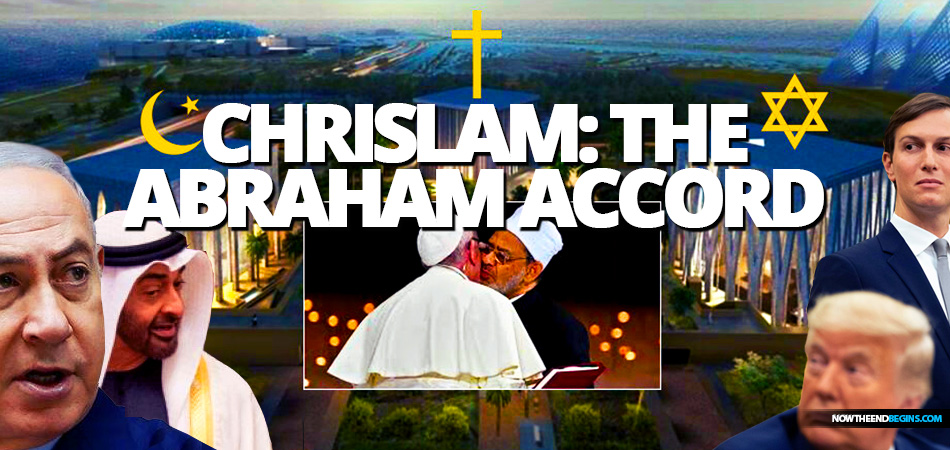
And then came the moment that changed everything: A phone call between Trump, Netanyahu and Abu Dhabi Crown Prince Mohammed bin Zayed Al Nahyan, leading to the announcement of peace on Trump’s Twitter account. The deal was called the Abraham Accords, named after the forefather of Jews and Arabs.
What a year it was. If you are a student of bible prophecy, 2020, was absolutely off-the-charts for you, I know it was for me. COVID-19 and the Great Reset aside, the story of the year was the stunning revelation and subsequent development of the Abraham Accords peace treaty between Israel and, well, all the Muslim nations that surround them. You know that old expression "kill them with kindness"? That would appear to be exactly what is taking place through the Abraham Accords.
"For, lo, thine enemies make a tumult: and they that hate thee have lifted up the head. They have taken crafty counsel against thy people, and consulted against thy hidden ones. They have said, Come, and let us cut them off from being a nation; that the name of Israel may be no more in remembrance. For they have consulted together with one consent: they are confederate against thee: The tabernacles of Edom, and the Ishmaelites; of Moab, and the Hagarenes; Gebal, and Ammon, and Amalek; the Philistines with the inhabitants of Tyre; Assur also is joined with them: they have holpen the children of Lot. Selah." Psalm 83:2-8 (KJB)
The common interpretation of Psalm 83 is that all the Muslim nations that surround Israel will form a confederacy between themselves, and then come at Israel in a united front. But what if that united front comes at Israel in the form of a peace covenant, a trap to lure them in and then strike? You know what the bible has to say about where 'peace and safety' in the absence of the King of Peace leads you, in case you forgot, here it is:
"For when they shall say, Peace and safety; then sudden destruction cometh upon them, as travail upon a woman with child; and they shall not escape." 1 Thessalonians 5:3 (KJB)
Furthermore, you do also realize that the apostle Paul was referencing the prophet Jeremiah when he borrowed that metaphor of a 'man giving birth', right? So what does that tell you? It tells you that a 'peace treaty' between Israel and her Muslim neighbors leads you directly to the time of Jacob's trouble. That's what it tells you if you believe the bible, I sure do.
"Ask ye now, and see whether a man doth travail with child? wherefore do I see every man with his hands on his loins, as a woman in travail, and all faces are turned into paleness? Alas! for that day is great, so that none is like it: it is even the time of Jacob's trouble; but he shall be saved out of it." Jeremiah 30:6,7 (KJB)
This is exactly where the Abraham Accords will lead Israel, directly to the doorstep of Antichrist confirming the Daniel 9:27 covenant. The prophet Daniel tells us that the Antichrist 'confirms the covenant', he doesn't create the covenant, it is already in place when he steps on the scene. I submit to you who study bible prophecy that that covenant is right now in place in the form of the Abraham Accords, and that the Pretribulation Rapture of the Church is right around the corner.
"And he shall confirm the covenant with many for one week: and in the midst of the week he shall cause the sacrifice and the oblation to cease, and for the overspreading of abominations he shall make it desolate, even until the consummation, and that determined shall be poured upon the desolate." Daniel 9:27 (KJB)

EVERYTHING YOU NEED TO KNOW ABOUT ISRAEL AND THE COMING TIME OF JACOB'S TROUBLE
The Abraham Accords domino effect will lead to more peace deals
FROM THE JERUSALEM POST: The love affair between Israelis and Emiratis began immediately. There was an effusive outpouring of support and excitement on social media from regular people in both countries. And on the diplomatic level, the governments immediately took action to make normalization a reality. Less than two weeks later, the first-ever Israeli delegation to the UAE landed in Abu Dhabi, led by National Security Adviser Meir Ben-Shabbat. Israeli flags waved in the airport where an El Al plane landed in Abu Dhabi for the first time.
The ensuing months have brought a flurry of business, cultural and diplomatic exchanges, and, of course, many thousands of Israeli tourists in Dubai this month, when the UAE was one of the only “green” countries Israelis could visit without having to quarantine when they arrived home. Even the talk of a deal to allow the UAE to buy F-35 planes could not mar the excitement. The US, Israel and the UAE have all said that the fighter jets were not part of the peace deal and never came up between the two Middle Eastern countries. At the same time, the US and UAE pointed out that Israel lifting its opposition to the sale – after Gantz met with his American counterpart and they reached an arrangement that satisfactorily maintained Israel’s qualitative military edge – was what greased the wheels on something the UAE had been seeking for the past six years.
In the last few months, we have also seen a veritable domino effect. It took the UAE’s courage to be the first Arab country in decades to take the plunge and establish diplomatic relations with Israel to inspire more to follow. Bahrain’s announcement came less than a month later, and its foreign minister took part in a peace-signing ceremony at the White House a few days after that. In mid-October, Ben-Shabbat led another delegation, this time to Manama. The Bahrain peace deal didn’t come with any strings attached to date, and has been purely about normal diplomatic and business ties, which have moved at a rapid pace, as with the UAE.

ANNOUNCEMENT OF THE CHRISLAM ‘ABRAHAM ACCORD’ BETWEEN ISRAEL AND UAE WAS MISSING LINK NEEDED TO LAUNCH VATICAN ABRAHAMIC FAITHS INITIATIVE
The next two dominoes to fall were Sudan and Morocco, but in a somewhat different way. In both cases, ties with Israel came together with a major shift in US policy in favor of those countries. Normalization with Sudan is highly symbolic for Israelis. Khartoum was the site of the Arab League’s “three noes” of 1967: no negotiations, no recognition, no peace with Israel. For Khartoum to overturn those three is truly momentous. The business opportunities in Sudan are fewer for Israelis, but Israel has already offered help in the areas of agriculture, water use, solar energy and more.
For Sudan, the normalization story was something else entirely. The announcement of steps toward ties with Israel came in late October, after pressure from Pompeo during negotiations to remove the African state from the US list of state sponsors of terrorism. That removal came over a year and a half after Sudanese dictator Omar al-Bashir was removed and Burhan, a Sudanese Army general, and civilian leader Abdalla Hamdok formed a government aimed at transitioning toward democracy. Getting off the list will likely drastically help Sudan’s economic recovery and access to international aid.
While the US denied making an ultimatum – recognize Israel or you stay on the list – it’s clear that Khartoum felt serious pressure. Hamdok was opposed to ties with Israel, while Burhan was more in favor – after all, he had met Netanyahu already – and both realized it was risky while their country’s situation was so shaky, but in the end they did it. Normalization with Israel was a small step to take toward something that was much bigger and more important for Sudan.
The same could be said about normalization between Israel and Morocco, announced in December. In King Mohammed VI’s announcement, a few short bullet points on renewing diplomatic relations with Israel came after seven lengthy paragraphs on the Trump administration’s agreement to recognize Moroccan sovereignty over Western Sahara. That recognition is the big prize Morocco wanted.
If the king had not been holding out for a big prize – as he saw Sudan and to some extent the UAE received – ties with Israel would have been easy. Israel and Morocco had secret ties, including intelligence sharing, for decades, and partial diplomatic relations in the 1990s. Those relations were officially suspended in 2000, but some level of ties has always continued, and many Israelis visit Morocco each year.
Still, since a million Israelis have roots in Morocco, and many have fond, positive feelings for the country and its royal family, this move was celebrated in Israel. And Morocco’s tourism minister expects 200,000 Israeli visitors a year, post-corona.
With 2020 behind us and 2021 beginning, there is discussion of even more dominoes falling, and even more countries joining the Abraham Accords. Trump administration officials have said they’re working to even make it happen in the next three weeks, before President-elect Joe Biden takes office.
Mauritania, Oman and Indonesia are the names on Israeli and American officials’ tongues these days, which makes sense, because Israel has or has had some level of ties with all of them. Mauritania declared war on Israel in 1967, but the countries established diplomatic relations in 1999, which were suspended in the wake of Operation Cast Lead in 2009.
Former prime minister Yitzhak Rabin visited Indonesia, the most populous Muslim country, and thousands of Israeli and Indonesian tourists visit each other’s countries each year. Netanyahu visited Oman in 2018, and Israel and Oman are part of the anti-Iran axis in the Middle East.
But the big hope is for Saudi Arabia.
This is where Biden comes into play. Biden and his foreign policy advisers have spoken positively about the Abraham Accords, without commenting on the strings attached. At the same time, they have been very critical of Saudi Arabia’s human rights record. If the Trump administration doesn’t find a way to quickly make it worth Riyadh’s while in the next few weeks, which seems unlikely, MBS and King Salman will probably wait to see what benefit they can exact from the Biden administration to go with peace with Israel. After all, the thought is, why shouldn’t they get something out of the deal, as the UAE, Sudan and Morocco did?
At the same time, a very senior official told The Jerusalem Post that Riyadh is expected to get on board in 2021. Netanyahu and MBS met in the Saudi city of Neom weeks ago. Salman is still reticent on the matter, holding on to the Arab Peace Initiative, also known as the Saudi Initiative, which requires peace with the Palestinians before normalization with the Arab League.
Looking ahead at the unfolding new year, it seems likely that the Abraham Accords domino rally will continue, and it seems almost inevitable that it will feature the biggest coup of all, Saudi-Israel peace. But if there’s anything we learned from 2020, it is that January can be drastically different from December in ways we never expected. READ MORE
No comments:
Post a Comment